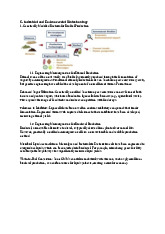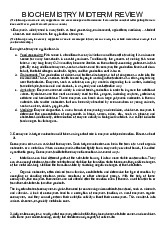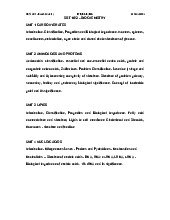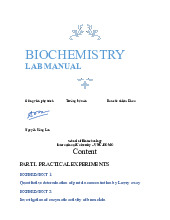






Preview text:
lOMoAR cPSD| 59085392 BIOCHEMISTRY REPORT 1
INTRODUCTION TO BIOCHEMISTRY
________________________________
Assoc.Prof. Le Hong Phu Class: BTBTWE234WE41
Date of submission: 11/09/2024
Student name: Hồ Công Nguyên Nguyên
Student ID: BTBTWE23036 I. Introduction:
This report delves into three key aspects that I studied and found intriguing during my first
biochemistry class with Professor Le. Personally, I think this task is a novel and useful way that
I could put into practice not just here, but also in other courses and my whole life. lOMoAR cPSD| 59085392
During this first lesson, I gained new knowledge not only from the biochemical domain, but also
from Professor Le's recollection of fundamental learning skills as he teaches us how to effectively
succeed in our student and researcher years, stay more focused in class, and gain a better
understanding of subject comprehension. By writing these sections below, I intend to capture a
solid summary of what I have acquired, both from the class lecture and my own understanding
so that future lessons can be better structured.
II. Three main points of lecture that I keen on:
II.1. The Maslow’s hierarchy of needs:
To impart this unique knowledge, we students were given a form that required us to name up to
three desires we aim for as our current selves. There have been numerous responses, including
love, prosperity, wisdom, enjoyment of life, sex, and so on. However, the majority of us have
failed to correctly recognise the underlying meaning of desires, as well as how we assess their
relevance to us. In truth, The Maslow's hierarchy of requirements is used to categorise our wants.
Understanding Maslow's hierarchy of needs is vital for students to gain a greater understanding
of their own needs, self-awareness, and life choices. Abraham Maslow created the Hierarchy of
Needs tool to assess a person's needs as they navigate life's challenges and possibilities. As
students, we attempt to grasp this pyramid in order to become more aware of ourselves, what we
need, and what is important. This pyramid is divided into five major levels, each of which clearly
expresses one's reliance on any part of life. Physiological needs:
This is Maslow's lowest level of needs, representing the five most important human wants. This
level contains one's most fundamental survival necessities. Humans, like all living organisms,
require energy for survival as the first step before addressing other psychological demands. This
stage is considered the most important. Perhaps this stage of requirements is the most similar to
biochemistry in that it discusses the body's need to take in "materials" required for processes and
reactions that sustain life. To reiterate, unlike in previous phases, we do not necessarily use these
items because we "like" or "want" them, but because we require them at the highest level of
dependency. As an outcome, we do not consider them to be wants, as Professor Le explicitly said.
Some examples of this categories include: •
To live: we referred to it as "survival" because the concept of "living" encompasses many
less important characteristics. Living itself is regarded as the decisive step in carrying out any
other ambitions, as going through this period allows for the successful realisation of other life missions and goals. lOMoAR cPSD| 59085392 •
Food and water: these constitute sources of nutrients and water that entering our bodies
for everyday life and contribute to the bodily functions. Without nourishment, our referred to as
mortal body will not have the energy to make it through the day. Nutrients have a critical part in
the biochemical reactions that allow us to survive and work as human beings, as well as in other
crucial activities such as blood circulation, respiration,... To live a healthy and long life free of
illness, it's important to consume a well-planned diet. •
Sleep: to corresponds to nutrient consumption. Sleeping well contributes to a good mental
state, helping the body to function not only instinctively but also intellectually, which is necessary given that we are humans. •
Air: like nourishment, is the body's ultimate essential for survival. Because humans
require oxygen to life, this basic process absorbs oxygen from the air, allowing us to breathe and
the blood to operate properly as it transports vital nutrients throughout the body. •
Sex: This phrase should not be confused with romantic pleasure. Sex is triggered by the
body's production of hormones, comparable to hunger and thirst. Hormones help maintain a
stable emotional state. The need for sex is crucial for a species' survival, as it ensures the continuation of generations. Safety needs:
The point of need accompanies the desire for basic living necessities. Safety refers to our
wellbeing and the ability to live a life with no disruptions. To avoid creating a scenario where
death is preferable to life, we aim for a life that is free of harm. Security includes both physical
protection and psychological confidence. •
Physical safety: refers to ensuring one's physical well-being. Essentially, it refers to the
absence of bodily harm, such as injuries, for any reason. Maintaining a healthy lifestyle free of
pain, violence, diseases, and death is essential. The desire for wealth and riches can prevent
hunger and competitiveness without resorting to violence. Humans seek resources, including
work, to protect their safety. •
Psychological assurance: Pain can be triggered by mental factors as much as physical
injuries to organs. Negative language and pessimism can lead to mental health issues like sadness,
isolation, moral degradation, low self-esteem, and self-harm. possibly with basic requirements
and physical safety, a low vulnerability to emotional distress can disturb life and possibly lead to
death. Friends and relatives also foster this type of safety as an instance of shared strength.
Love and belonging needs:
One then yearns for the referred to social demands after leaving the satisfaction of protection. In
addition to protecting the wisher from danger and fulfilling their need to fit in, this requirement
guarantees a higher degree of emotional fulfilment. Perhaps the most fundamental fear at this lOMoAR cPSD| 59085392
level is that of solitude, which, although protecting its bearer from danger, serves to passively cut
them off from the outer world. •
Love: This is the condition of loving and being loved. Those with this need strive to
connect with others and gain a sense of belonging in the world. It's important to feel validated by
others when living one's desired existence. Both want to bond by expressing their feelings and
hearts with others and wishes for hearing it back from those with whom he develops a bond as a
gesture of appreciation, harmony, and recognition of their role in their peers' lives, which
contributes to their emotional importance. Mutual permission is required to share love with
family members, friends, or a romantic partner. Sharing love within a community fosters feelings
of belonging and acceptance. Acceptance empowers individuals to survive and adapt to their environment. Esteem:
Maslow's hierarchy of needs suggests that after experiencing love, individuals seek esteem, or a
sense of self-worth. Analytically, this is the "evolution" of a person's desire for love and attention,
often known as "attention seekers." This level strives to increase recognition and focus on the
yearners' unique features, such as looks, personality, and intrinsic talents. At this stage, the goal
is not to improve one's expression, but rather to feel appreciated for being "who they are" or "who
they were". Confidence can be built through personal achievements, records, or other means. For
example, acquiring superior competence against "foes," acquiring personal riches acknowledged
and respected by others, or, for certain students, achieving an A or A+ in classes and outperforming others. Self-actualization:
This is considered as the most profound stage of needs, which goes above the point of esteem.
Self-actualization refers to creating a pictured image of oneself in order to achieve one's
maximum potential and live a fulfilling life without seeking external attention.
Some individuals may prioritise achieving a "deeper" purpose of life over material necessities
like money, fame, recognition, and survival. Individuals seeking this level may have met their
fundamental and social needs, or may be unconcerned (for instance, followers of popular
religions such as Christianity or Buddhism). Philosophical achievements, often known as
"transcendence," refer to the pursuit of spiritual understanding beyond the senses. This highest
level aligns with aesthetic demands, which prioritise beauty and sensory satisfaction. A fruit is
desired not just for its nutrients, but also for its sweet taste. Similarly, a vehicle is desired not
only for its utility, but also for its aesthetics and worth. lOMoAR cPSD| 59085392
This is the level at which one sincerely pursues wisdom and knowledge, and intellect plays an
important part. Cognition, or one's own conscience yearning for "true lives," is the motivator that
motivates people to create their own existences. With cognition, one attempts to understand the
universe, oneself, their peers, and the natural world around them, as well as to gain more wisdom,
creativity, and idealism. They seek for realisations, to see their ideas come to reality.
With intellect, one acquires their actual dreams, and hence their own cause for living and being.
II.2. Bloom’s Taxonomy:
The last noteworthy thing I learnt from Prof. Le is that he mentioned and clarified Bloom's
Taxonomy. Maslow's hierarchy of needs places emphasis on the hierarchy of needs, whereas this
1956 term seeks to "enlighten" students on the essential stages they need to follow to fully
understand a course. These steps, which are broken down into six key phases, are also how we
fully apply cognition to our lives: •
Remember: the most fundamental stage in the learning process. This needs the brain's
basic capability of memorising and retaining new information. Without memorising, students
struggle to do critical intellectual tasks and connect with others due to a lack of understanding of
their role in our lives. To improve learning skills, it's important to develop basic attention and
focus skills. This allows for improved memorisation and recall of crucial ideas for problem
solving and problem recognition before moving on to more creative activities. •
Understand: that simply recalling information is insufficient to process knowledge.
Understanding is the next stage after memorisation skills. It helps individuals to recognise not
just facts but also the substance of things. They can mix various information from memories to
create a fused outcome of thinking. •
Apply: to comprehend anything is to recognise that facts are what they are, and to apply
something is to put what one has learnt into practice. Rules and facts must be used in order to
generate an intellectual solution that can be employed as a tool. The world is moving towards a
modern future mostly because of these answers. •
Analyse: As one grows more efficient at performing applications, they will have the
ability to view topics with clearer insights. If application is a step ahead, evaluation is a step
reversed, in which matters are broken down into smaller parts in order that they can be reapplied to generate ideas. •
Evaluate: Not just should one have the ability to identify the elements of a situation, yet
they should also be able to rate such objects. This enables people to evaluate ideas and issues at
hand, increasing the general effectiveness of problem solving. •
Create: the pinnacle of studying, the ability to produce items that contribute to one's
personal development as well as the development of the world at large. lOMoAR cPSD| 59085392
II.3. The meaning of biochemistry and first-hand understandings of the organization of life:
As the name implies, biochemistry is the study of the chemistry that occurs within living beings.
Unlike larger chemistry, which encompasses the physical universe, its natural and manmade
elements, and their qualities on a "wide scale," biochemistry focusses on the primary biological
contents of living bodies or those associated to them at the molecular level. Organization of life:
The organisation of life levels is a significant point that I've taken note of. Essentially, life begins
with the most basic, microscopic structures and progresses to the most intricate, numerous ones.
Comprehending this arrangement contributes to comprehending the key principles and
fundamentals of the body's contents and biochemical activities. •
Atoms are the most basic known structure in the physical world. Atoms are the
fundamental building blocks of all matter, living or not, and they make up all of the figures we
see around us. The earliest step of atom formation is known as components, or figures of
individual atom types. There are numerous elements with distinct properties that can be obtained
both in nature and by artificial, chemical processes. The human body has four major elements:
oxygen (65%), carbon (18.5%), hydrogen (9.5%), and nitrogen (3.3%), among others, all of
which perform important functions. This information gives us firsthand knowledge of the most
important components that maintain the way we live and exist. •
Molecules are formed when different sorts of atoms come together and become more
complicated. This is a fundamental level that, despite having no life of its own, contributes to
and sustains the life of other organisational levels. •
At this stage of organisation, we discover terms like water, glucose, and proteins. These
names supply vital necessities to the living body, such as energy for cell activity and nutrients for
metabolic activities. The more complex formations of molecules, known as macromolecules, are
also the most fundamental components that are directly involved in the body's fundamental
changes, such as biochemical catalysts, genetic information storage and transmission, energy
production, and even immune system defence against bacterial infections.
These macromolecules include carbohydrates, lipids, nucleic acids, and proteins. •
Cells and organelles: While the complicated complexity of life continues, the most basic
understanding of biochemistry will be presented here. It is because cells, which are formed by
the maintenance and activity of organelles, are the most fundamental unit of life. Understanding
the production and nature of molecules leads to a better understanding of the processes that occur
within them. In this regard, it is vital to understand the development of molecules into organelles,
or the parts of an active cell. As we comprehend what's going on inside a cell, the processes lOMoAR cPSD| 59085392
requiring various molecules with diverse bonds, we also understand the important ideas of our
bodies and other species, from the tiniest to the largest.
In particular, biochemistry focusses on four fundamental terms: carbohydrates, lipids, proteins,
and nucleic acids, all of which are crucial components in living organisms. These phrases refer
to the decomposition and synthesis of matter, often known as metabolic processes. It is here that
we learn about the structure of these substances their shapes and bondings, the connection they
have in metabolism, and their roles in reactions that sustain life and development in living creatures.
Enzymes - proteins that act as catalysts for the body's essential reactions; kinetics - explaining
the factors that influence enzyme activity rates and possible modifications; metabolism - the
process of channelling energies within ourselves to preserve healthy cell functions and pathways;
photosynthesis; oxidation;... All of these areas will be thoroughly explored in order for students
to gain a complete understanding of both fundamental and advanced concepts involving inner body reactions.
To summarise, biochemistry teaches students about the molecular foundations of life, namely the
chemical mechanisms and metabolisms that form life itself. Biochemistry helps Biotechnology
students gain vital chemical understanding for their careers and future paths. III. Conclusion:
It is noteworthy and fascinating to keep in mind in Prof. Le's first lesson that this significant man
did not prioritise striking the direct concepts of his field of biochemistry, but rather that he had
allowed us to gain an understanding of the steps we must take to effectively grow, both as learners
and as growing adults, aiming to draw lines for ourselves and walk towards the future.
Surprisingly, I absorbed Prof. Le's lecture. I've never met a professor with such a distinct, casual, but welcoming demeanour.
I believe Prof. Le's strategy was to encourage self-study by urging us to pre-read his courses at
home and discuss them later. In this report, I avoid discussing enzymes and other biochemical
concepts as I only have a basic understanding of them. Discussing them would be dishonest. That
is why, in this article, I intend to give the majority of what I know about the actions I should
follow to properly appreciate Prof. Le's instruction. I hope that following this assignment and
subsequent conversations regarding biochemistry, I will be able to produce more extensive
reports that include the majority of my freshly updated understandings.



